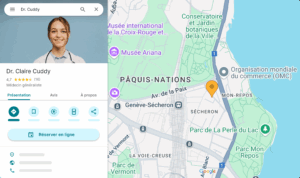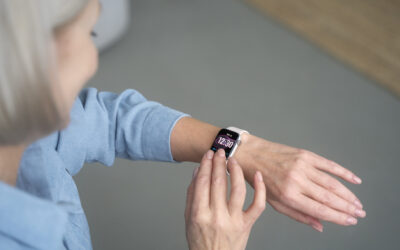
Swiss patients are increasingly adopting digital health services: online appointment booking, searching for professionals on Google, managing medical documents. A study conducted in March 2025 by OneDoc and the polling institute MISTrends sheds light on these new habits. Discover the results and what they mean for you as healthcare professionals.
Swiss patients are increasingly connected to their health
According to our survey of 1’124 patients across Switzerland’s 3 language regions, the results are clear: the majority already use digital tools along their care journey. More concretely:
- Online visibility: over 60% say they search for their doctor via Google or specialized platforms
- Appointment booking: nearly 37% prefer to book online rather than by phone
- Trust: 55% believe digitalization improves their care experience (faster access, smoother follow-up)
These figures reflect an undeniable reality: Swiss patients expect the same digital simplicity from their doctors as they do from their bank or insurer.
Why are digital tools necessary in medicine?
The growing enthusiasm for digital tools is not just a fad. It also responds to very real difficulties encountered along the care pathway.
According to the survey, about one in ten Swiss patients faced significant difficulties in their care journey over the past 12 months. The main obstacles include:
- Difficulty accessing care: inability to obtain an appointment within a satisfactory timeframe.
- Inefficient communication with the primary care physician.
- Insufficient medical follow-up.
- Lack of availability of doctors accepting new patients.
These issues appear to be symptomatic of today’s healthcare system in Switzerland, with a shortage of professionals in certain sectors. To address this, digital solutions help streamline and simplify access to care.
Booking medical appointments online: an essential tool in Switzerland!
According to our study, online appointment booking is now essential for a growing share of Swiss patients.
Google: patients’ first reflex to find a doctor
When looking for a doctor, Swiss patients first turn to Google. More than 60% of respondents say they use the search engine as their main entry point, and nearly 40% also consult Google Maps.

OneDoc, the reference platform in healthcare
Behind Google, OneDoc stands out as a key player for medical appointment booking. One in two people in Switzerland already knows the platform, and this figure reaches 75% in French-speaking Switzerland.
Nearly 20% of patients nationwide and 44% in French-speaking Switzerland say they search for a specialist directly on OneDoc. By comparison, other platforms such as Comparis, Local or certain cantonal solutions are used far less (under 10%).
These findings confirm that OneDoc is now the digital reference for searching and booking medical appointments in Switzerland.
What other benefits of digital tools are perceived in healthcare?
Beyond appointment booking, Swiss patients see other important benefits in the digitalization of their care journey.
Here are the 5 benefits that emerged from our study:
- Online appointment booking (55%)
- Online prescription renewal (47%)
- Online administrative pre-admission (27%)
- Online emergency triage questionnaire (25%)
- Digital referral form (23%)
Note that teleconsultation is favored by 15% of respondents.
What motivates patients to use digital solutions in healthcare?
Various advantages motivate people in Switzerland to want more digital in healthcare:
- For 57% of respondents, the primary motivation is reducing healthcare costs.
- 51% see an improvement in their care.
- Finally, 45% value above all better access to care and the ability to centralize their medical data effectively.
The electronic patient record (DEP): little known and underused
The electronic patient record (DEP) clearly illustrates the gap between expectations and reality. Designed to centralize medical data and facilitate communication between doctors and patients, it is still not widely adopted.
Only 16% of Swiss people surveyed say they have one, and 40% are unaware it exists. For context, in August 2024, the FOPH indicated that barely 1% of the population had an active DEP.
There are many barriers:
- Lack of encouragement from doctors (30%),
- Concerns related to data security (10%),
- Perception of limited usefulness (10%).
Despite this, the DEP remains a key tool to improve medical follow-up and strengthen care coordination in the future.
What concrete benefits do Swiss patients expect from digital?
In summary, Swiss patients want the digitalization of healthcare to provide:
- Easier access to care, thanks to appointments that are quick and simple to book online.
- Centralization of medical data, enabling continuous follow-up and better coordination among professionals.
- A smoother, more modern care experience, personalized to their needs.
These expectations represent a major opportunity for healthcare professionals who want to strengthen patient relationships and optimize their organization.
How to effectively integrate digital tools into your medical practice?
To meet your patients’ growing needs, several simple actions can be implemented:
- Offer online appointment booking in addition to phone booking.
- Create and maintain a Google Business Profile, activating the “Book online” button.
- Communicate actively about the digital services available in your practice to encourage adoption.
- Use digital tools to improve patient follow-up and personalize care.
- Encourage teleconsultation for simple follow-ups to reduce waiting times and improve access to care.
Study methodology
This survey was conducted online by OneDoc, Farner and MIS Trend in March 2025, among a representative sample of 1’124 Swiss residents aged 18 and over (396 in French-speaking Switzerland, 434 in German-speaking Switzerland, and 294 in Ticino). The maximum margin of error is ±2.9% at the national level. The data were weighted to ensure regional and linguistic representativeness.





